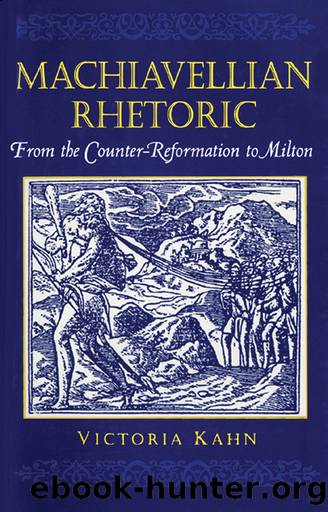Machiavellian Rhetoric by Victoria Kahn;

Author:Victoria Kahn; [Kahn;, Victoria]
Language: eng
Format: epub
ISBN: 9781400821280
Publisher: Princeton UP
Published: 2021-09-15T00:00:00+00:00
PART THREE
MILTON
MILTON provides one of the best challenges to the usual histories of Renaissance Machiavellism and one of the best examples of the revised definition of Machiavellism proposed in this book. In the usual account, Milton figures as one of the happy few who read Machiavelli as a theorist of republicanism rather than as the arch-hypocrite, rhetorician, and atheist we know as the paradigmatic Machiavel.1 Among the texts adduced to support this view are Miltonâs commonplace book, which includes numerous references to Machiavelliâs Art of War and Discourses; the possible allusion to Machiavelli in the sonnet to Vane; the discussions of republics and mixed commonwealths in the prose, such as in The Ready and Easy Way; and, finally, Aubreyâs much-quoted remark that Milton was a republican because he was âso conversant in Livy and the Roman authors, and the greatness he saw done by the Roman commonwealth.â2 And yet the standard equation of classical republicanism with secular political theory would seem to make it inapplicable to Milton above all.3 Nor can the usual histories of Machiavellism fully account for the fact that the Machiavel and the republicanâfar from being decorously distinguishedâare conspicuously linked in Miltonâs work, most obviously in the Satan of Paradise Lost.
The discussion of the doctrine of things indifferent in part 2 of this book suggests a different approach to Miltonâs Machiavellism, one that is compatible with his theological and rhetorical concerns. In the following pages I argue that if we take seriously Miltonâs intervention in the ongoing debate regarding things indifferent, as well as his portrayal of Satan as Machiavel and rhetorician, we are in a better position to understand Miltonâs republicanism in the later prose works and in Paradise Lost. As we will see, Milton was Machiavellian in a way Machiavelli would have appreciated: he understood the rhetorical dimension of politics exemplified by Machiavelliâs Prince and Discourses; and much of his work can be seen as an extended meditation on the relation of rhetoric and faith not only to virtue but also to virtù. In turn, Milton the radical puritan and rhetorician helps us further to revise the usual histories of Machiavellism as secular political thought in the English Renaissance.
Specifically, Milton understood that the rhetorical politics embodied in the doctrine of things indifferent was at once a condition of Christian liberty and a threat to its realization. From Comus to Areopagitica to Paradise Lost, Milton enlarged the sphere of indifference in order to enlarge the role of rhetorical debate and individual discretion, as well as the possibilities for individual virtù. He thus gradually articulated a defense of Christian liberty, as well as the presuppositions that would eventually lead him to argue in favor of republicanism. At the same time, he was acutely aware of the Machiavellian underside of such a defense. In particular, Miltonâs conception of truth as âknowledge in the makingâ seemed at times even to him to be the product of a stereotypically Machiavellian hubris or self-aggrandizement. Two conclusions follow from this analysis. The
Download
This site does not store any files on its server. We only index and link to content provided by other sites. Please contact the content providers to delete copyright contents if any and email us, we'll remove relevant links or contents immediately.
The Power of Myth by Joseph Campbell & Bill Moyers(925)
Half Moon Bay by Jonathan Kellerman & Jesse Kellerman(911)
A Social History of the Media by Peter Burke & Peter Burke(882)
Inseparable by Emma Donoghue(844)
The Nets of Modernism: Henry James, Virginia Woolf, James Joyce, and Sigmund Freud by Maud Ellmann(739)
The Spike by Mark Humphries;(719)
A Theory of Narrative Drawing by Simon Grennan(707)
The Complete Correspondence 1928-1940 by Theodor W. Adorno & Walter Benjamin(704)
Ideology by Eagleton Terry;(659)
Bodies from the Library 3 by Tony Medawar(649)
Culture by Terry Eagleton(646)
World Philology by(645)
Farnsworth's Classical English Rhetoric by Ward Farnsworth(641)
A Reader’s Companion to J. D. Salinger’s The Catcher in the Rye by Peter Beidler(614)
Adam Smith by Jonathan Conlin(608)
High Albania by M. Edith Durham(592)
Game of Thrones and Philosophy by William Irwin(592)
Comic Genius: Portraits of Funny People by(581)
Monkey King by Wu Cheng'en(577)
